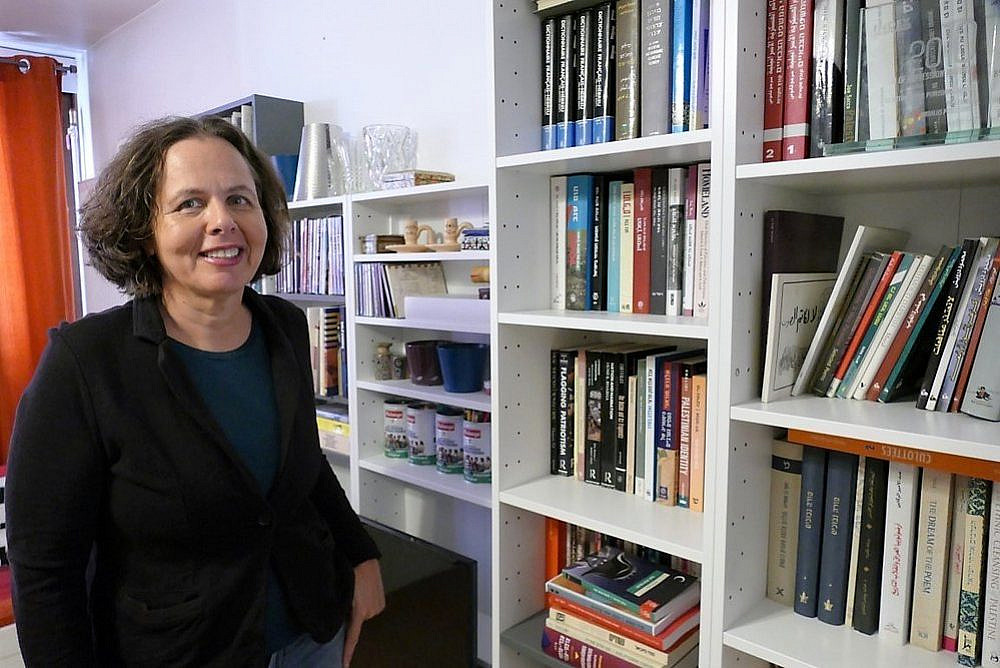In the shadow of the anti-government protests in Israel and the pension reform mass movement in France — a series of strikes and demonstrations organized over the last two months in opposition to the government’s attempt to raise the retirement age — a small-scale but politically significant election is unfolding. Yael Lerer, an Israeli Jew who has dedicated her career to fighting for equality and justice in Israel-Palestine, is running for a seat in France’s parliament. Her candidacy has been endorsed by the New Ecological and Social People’s Union (NUPES), an alliance of political parties that now constitutes the French left.
Lerer is seeking to replace Meyer Habib, an ally of Netanyahu’s and the former deputy of the eighth constituency of French residents living abroad, which represents French citizens living in Israel-Palestine as well as other parts of the eastern Mediterranean. As deputy for the past decade, Habib has developed a notorious reputation for focusing almost exclusively on securing unconditional support for Israel in the French parliament, and for promoting the idea that anti-Zionism is “the new antisemitism.”
Though Habib was re-elected during France’s legislative elections last June, the Constitutional Council — France’s highest constitutional authority — invalidated his election in early February due to several “electoral inconsistencies.” Regarded as a victory for the French left, the court’s decision made space for new candidates to fill Habib’s vacated seat — including unexpected ones, like Lerer.
Born in Tel Aviv, Lerer founded the Andalus Publishing house, which translates Arabic literature into Hebrew, and helped to establish the Balad party, later serving as its spokesperson and parliamentary attaché. She moved to France in 2008 and became a naturalized French citizen in 2016, but remains connected to Balad, returning to Israel for certain electoral campaigns; one such trip occurred in 2013, when she was heckled on a pre-election panel while presenting Balad’s vision of transforming Israel into a state of all its citizens.
Lerer’s candidacy contrasts sharply not only with Habib’s, who is once again running for office, but also with Deborah Abisror-De Lieme’s, who ran against Habib in last June’s election. Despite disagreements between Abisror-De Lieme and Habib, a debate in June 2022 highlighted their shared support for the Israeli right. Abisror-De Lieme claimed Netanyahu had been a “great prime minister,” expressed total agreement with Habib on Jerusalem’s status as Israel’s capital, and vowed to defend Israel unequivocally if the French government were to adopt an “anti-Israel position.” In an interview on i24NEWS this February, she claimed, “I don’t need to prove my Zionism, or my love for Israel.”
Unlike Abisror-De Lieme and Habib, Lerer’s campaign website clearly states her opposition to the “new far-right coalition government in Israel,” and her “peaceful resistance against the occupation.”

In the French political sphere, the fight against antisemitism is seen as incompatible with support for Palestinian rights: the National Assembly recently adopted the contested International Holocaust Remembrance Alliance (IHRA) definition of antisemitism; politicians from all sides of the political spectrum have pushed back against a proposed resolution condemning Israel’s “apartheid regime” put forth by left-wing (especially communist) deputies; and, when a far-left politician engaged in Palestinian solidarity work was appointed to the National Assembly’s working group on antisemitism, she faced an uproar from French-Jewish organizations. By seeking to destabilize the binary between fighting antisemitism and supporting Palestinian rights, Lerer’s campaign is an anomaly in the world of French politics.
With only 193 votes separating Habib and Abisror-De Lieme last June, and a voter turnout rate of under 14 percent, the outcome of this upcoming round of elections is uncertain. Online voting for the first round will begin on March 24, with final election results announced on April 17 — and Lerer believes her campaign has a “real likelihood of success.”
Lerer recently spoke with +972 magazine about her out-of-the-ordinary campaign. The conversation has been edited for length and clarity.
What motivated you to run for this position?
I started my activism very early, when I was 12 years old. Before moving to France, I regularly organized demonstrations of the radical left in Israel. I was living between Israeli and Palestinian society, spoke Arabic daily, and did many media interviews in Arabic. Since the Oslo Accords, I haven’t presented myself as a “peace activist,” but rather as an activist for equality and justice in Israel-Palestine. Either everybody wins, or everybody loses; having equality and justice means making sure that everybody wins.
People sometimes ask me: “Why did you leave Israel?” My answer is that I never left. I’m always between the two countries. Every day, I speak three or four languages. This is at the core of my campaign: the people voting in my district have dual citizenship, and they are binationals. They reflect the reality that the world is constantly in motion, that people are moving from one place to another, back and forth. I believe you should not have to prove your “loyalty” to one country — an idea present in the right-wing discourse in France. You should be loyal to the republican values of equality and solidarity. I want people to be socially and politically engaged in all the countries they have a connection to.

During his 10 years as deputy, Meyer Habib, a strong supporter of the Israeli right who has close ties with Netanyahu, has firmly defended the idea that anti-Zionism is “the new antisemitism,” and centered his political career around securing unconditional support for Israel in the French parliament. How does your political vision differ from his?
I started this campaign to try to create a space in France where we can criticize the Israeli government’s politics. I’m not just fighting for Palestinian rights — I’m fighting for justice and equality in Israel-Palestine. I also have zero tolerance for antisemitism, and any antisemitic rhetoric that might exist in the solidarity movement. When I was working with the Balad party in Israel, our slogan was “a state for all its citizens.” I carry these ideas with me today.
For the last decade, the eighth constituency has been represented by officials who act as spokespeople for the Israeli government, but I want to represent all citizens in this constituency and the values of the French Republic, everywhere and for everyone. My campaign focuses on French republican values, which are the DNA of French society. We want these values for everybody, everywhere.
But I am also running to represent people beyond Israel-Palestine [the eighth constituency covers Greece, Turkey, Italy, Malta, and Cyprus as well], and there are other issues that affect these constituents. First and foremost, I am running to represent these French citizens, including around issues of facilitating consular services and ending double taxation [taxation on the same income by two jurisdictions].
You occupy a role almost entirely absent from the French political landscape — that of a Jew fighting for justice and equality in Israel-Palestine. What message do you think your candidacy sends to the French political leadership, Jewish institutions, and the French-Jewish population?
It’s very sad that this is rare. People think that I’m “radical,” but I disagree. Wanting liberty, equality, and solidarity is not “radical.” These are basic values.

My Jewish heritage is very important to me. I wouldn’t describe myself as a French Jew, as I’m not an organic part of the Jewish community in France [Lerer was born in Israel]. But I do ask myself what happened to this community. How did an organization that claims to represent this community become an ambassador of Israel, and also of Netanyahu and the right wing? [Lerer is referring to the Representative Council of Jewish Institutions in France (CRIF), a centralized institution that aims to provide a unified political voice on behalf of France’s Jews.]
What do you perceive to be the ripple effects of the situation in Israel-Palestine on French society, including on relations between Jews and other minorities?
People misunderstand the dynamics at play in the French-Jewish community. Since I’ve moved here, I’ve been shocked by the gap between the discourse in the media and the reality on the ground. That reality is much more shaped by coexistence than the media portrays it to be. I have the privilege of living in a part of Paris [the 19th arrondissement] where Jews are very visible. We have a reality of coexistence, from Jews buying what they need for Rosh Hashanah from Arabs at the market to Jews and Arabs working together in the arts and other fields. Coming from Israel, where everything is so segregated, this coexistence is remarkable to me. People say that Jews don’t have a future in France, but that’s not true.
Most read on +972
While the French left has not been subjected to the kind of concerted campaign that fractured the British Labour Party, it has repeatedly been accused of antisemitism by centrist and right-wing politicians, as well as by Jewish organizations, largely for its support for Palestinian rights. How do you view the politics of Israel-Palestine in France today? How can we emerge from this binary opposition that frames French Jewish safety and Palestinian rights as fundamentally incompatible?
Unfortunately, Israel-Palestine is basically not on the agenda of the French left at the moment. The left is afraid of dealing with Israel-Palestine. You cannot criticize Israel, and you can get quickly attacked for saying something, so people just don’t want to engage.
To me, it doesn’t make sense to say you are speaking out against antisemitism and in favor of republican values, as Meyer Habib and Deborah Abisror-De Lieme do, but then support the construction of settlements and demand that international law not be applied in Israel. We need to apply our republican values — liberty, equality, fraternity — to all causes, to Israel-Palestine and beyond.




